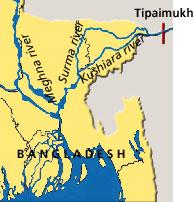While Hydroelectric projects are typically considered greener than other power generation options in short term, it has significant long-term impact to the environment like changes in the ecosystem, destroying nearby settlements and changing habitat conditions of people, fish and wildlife. Especially in the densely populated countries like India and Bangladesh, where rivers are lifelines, projects like Tipaimukh will create adverse effect to a huge number of population and their habitats.
No wonder right from the start this project faced protests from potentially affected people in India, and from the downstream neighbor Bangladesh. The people of Manipur have been fighting legally to stop the project but have so far been unsuccessful. The Indian government is going ahead with the plan. The Sinlung Indigenous People Human Rights Organisation (SIPHRO) of India said that “the process for choosing it (the project premises) ignored both the indigenous people and the recommendations of the WCD (World Commission on Dams)”.
From Bangladesh journalist and blogger Dhibor says:
এই বাঁধ তৈরির কি অজুহাত হিসেবে বলা হচ্ছে, আসামের বন্যা নিয়ন্ত্রন এবং জল বিদ্যুত উৎপাদন করে, উঃ পুর্ব ভারতের মানুষদের প্রভুত কল্যাণে এই বাধ নির্মিত হবে। পাঠকদের জ্ঞাতার্থে জানাচ্ছি যে, আন্তর্জাতিক পানি আইন অনুসারে, ভাটির দেশের পুর্ণ সম্মতি ছাড়া এবং পরিবেশের ক্ষতি করে কোন দেশই একতরফাভাবে নদী শাসন করতে পারবে না। তবে পরিতাপের বিষয় হলো, আন্তর্জাতিক আইন মানতে কোন দেশ বাধ্য নয়। এখানে জোর যার মুল্লুক তার হিসেবেই এই আইন প্রযোজ্য। ভারতের তুলনায় আমাদের অর্থনৈতিক-সামরিক বা খুটির জোর অল্প বলে, আমাদের মার খেয়ে যেতেই হচ্ছে।
উঃ পুর্ব ভারতের অধিবাসিদের নাকের সামনে টিপাইমুখি বাধের মুলো ঝুলিয়ে রাখা হলেও, তারা পঃ বঙ্গের অধিবাসিদের মত ভোলেননি। তাই এই বাধের বিরুদ্ধে সেখানে তীব্র প্রতিবাদ হচ্ছে। মনিপুরের ২০টি প্রভাবশালি সামাজিক রাজনৈতিক সংগঠন, “একশন কমিটি এগেইনস্ট টিপাইমুখ ড্যাম” এর ব্যানারে রাজপথে নেমেছেন। কারণ এতে উঃপুর্ব ভারতের লাভের চেয়ে লোকসানটাই বেশি হবে। আর প্রভুত ক্ষতি হবে পরিবেশের।
Residents of the North Eastern parts of India were pampered with many baits of the Tipaimukh dam project, but they kept their cool. About 20 influential socio-political organizations in Manipur have united in the banner of “Action Committee against Tipaimukh Project” and are protesting against the project. The reason – this dam will bring more miseries to those people than the profits pledged. And there will be severe damage to the environment.”
From India Namdingpou Kamei at E-Pao lists the losses and destruction this dam will bring to the local people.
# A total area of land 286.20 sq. km will be submerged forever.
# Barak waterfalls and Zeilad Lake, which are connected with the history of the Zeliangrong people, will be forever underwater and all folklores and legends will have no monuments’ proof and it will become a make up story for the next generation.
# More than, 40,000 people will be rendered landless.
# Eight villages situated at the Barak Valley will be completely underwater.
# More than 90 villages mostly of Tamenglong district will be adversely affected.
# About 27,242 hectares of cultivable land will be lost. [..]
The Indian government has offered the Manipur state 10% free electricity (i.e. 40 MW) from the project in exchange of above.
The Hmar indigenous population of North East India fears that:
if the government plows ahead with its proposed dam “thousands of outsiders” will come to settle in the area and as a result the Hmars will be exposed to changes like never before to new culture, economy and politics.
Dr. Soibam Ibotombi of Dept. of Earth Sciences, Manipur University says that the dam will be a geo-tectonic blunder of international dimensions:
The site selected for Tipaimukh project is one of the most active in the entire world, recording at least two major earthquakes of 8+ in the Reichter Scale during the past 50 years. The proposed Tipaimukh HEP is envisaged for construction in one of the most geologically unstable area as the proposed Tipaimukh dam axis falls on a ‘fault line’ potentially active and possible epicenter for major earthquakes.
At BanglaPraxis the impact of Tipaimukh dam in Bangladesh has been discussed.
Paribartan Bangla writes [bn] that several campaigns are ongoing in Sylhet, Bangladesh protesting the Tipaimukh dam. The blogger describes:
এই বাঁধ নির্মিত হলে সিলেট, সুনামগঞ্জ, মৌলভীবাজার, হবিগঞ্জ, ব্রাহ্মণবাড়িয়া, কিশোরগঞ্জ, নেত্রকোনা, নরসিংদী ও নারায়ণগঞ্জ জেলাসহ দেশের সমগ্র উত্তর-পূর্বাঞ্চলে মারাত্মক পরিবেশ ও আর্থিক বিপর্যয় নেমে আসবে। কৃষি, মৎস্য, জীববৈচিত্র্য হুমকির মুখে পড়বে। বর্ষাকালে প্রবল বন্যা আর শীতকালে পানির জন্য হাহাকার দেখা দিবে।
Blogger Agami calls other bloggers [bn] to engage in online and offline campaigns to stop the project. A Facebook group has already been created by the bloggers. An online petition has been launched by the “Action Committee against Tipaimukh Project”.
Anandomoye writes [bn]:
উন্নত দেশগুলো যখন স্বল্প ও দীর্ঘমেয়াদি কুফলের কথা বিবেচনা করে বাঁধের মতো অবকাঠামো নির্মাণের মাধ্যমে প্রকৃতিকে নিয়ন্ত্রণের দুর্বুদ্ধি থেকে পিছিয়ে আসছে, সেখানে ভারতের এমন একটি বাঁধ নির্মাণের প্রস্তুতি আরো গভীর পর্যালোচনার দাবি রাখে।









91 comments
people r living with nature.if it build then it will be a matter of life and death of the people of north and estern bangladeshi people.so anyhow tipaimukh dam should be stop.so no to tipaimukh dam
Just listen to some of the Bangladeshi Minister comments. You will find an overwhelming support for Tipaimukhi Support. And the thing is it isn’t surprising at all. What were you thinking when you people voted these people to power?
It is good to see people raising concerns about Tipaimukh and asking the government to stop it. The adverse effects that the dam could bring are well said, and oft-repeated by bloggers in internet and experts at seminars and TV talkshows. And everybody looks complacent ending his or her duty by raising concerns and advising government or calling others to join the campaign. Is that enough? Would somebody tell what we should do? Should we rage a war against India? Will ministers publicly bashing India solve the problem? Or will it be solved if we take the issue at UN? There were calls for raising Farakka issue at UN, but no governemnt took it to Un in last 40 years. We must not forget that Farakka was done through a secret understyanding between India and the then Pakistan governments.
Speaking at seminars and talk shows in airconditioned rooms, or raising concerns through blogs are something like staying at a safe distance and shifting responsibility to govt.
We need someone like Bhasani who will take the nation to Sylhet frontiers and station there until India abandons its dam or hydle plant at Tipaimukh. Demonstrators today will get a much wider global media attention than Bhasani had 40 years back. And they will be able to put effective pressure on the government to act decisively. We need leadership to gherao Indian mission in Dhaka to stop Indian diplomats from talking nonsense and compel Indian govt to forget about Tipaimukh dam for ever.
If we choose to stay indoors avoiding hot summer and end our duty by just advising the govt and people through blogs seminars, talk shows and blogs, we are no better than opportunists.
It’s a big problem for our country as well as some parts of India. Environmental devastation will be occur if the dam is built. As an environmental scientist i want say that the government and the people should go ahead to stop the dam construction, otherwise all of us have face many environmental,social, economical and political problems.
So, let say, No To Tipaimukh Dam.
India’s lust for water has become unending. It has built dams after dams over the past fifty years and diverted water from the rivers that have flown to neighboring countries. In building dams for meeting irrigation and hydrolic needs India has shown wanton disregard to the requirement of the people of neighboring countries. The Farakkha barrage was built to facilitate the navigation of the Hooghly river on which the Calcutta port is located but experts disgareed that the Farakkha was not needed for the navigation of the Hooghly river. In building Farakkha India has dismissed the plight of the population of Bangladesh and violated the rules of the usage of the waters of the International rivers. It has betrayed Bangladesh on sharing the Teesta water and now it has moved to divert water from the Barak river. What is more painful is the complete silence on the part of the Bangladesh Government on this dangerous project which, if implemented, will bring havoc to over 30 million people of the country. Begum Khalida Zia, the leader of the Opposition at the parliament and chief of BNP has done well in writing to the Indian Prime Minister urging him to stop the contsruction of Tipaimuk dam. Bangladesh Government should note that if it fails to protect the interest of the people, people will take care of its own interest. The Awami League leadership should bear in mind that golden Bengal belongs neither to the Awami League nor to the Mohajhute but to the people of Bangladesh and none else.
If this Dam is made, it will destroy both Manipur in India and some part of Bangladesh especially Sylhet. Everone should take a lesson from the Farakkah Dam which never fulfilled the promise India made. It is a national issue where everyone should be united regardless of our political views. It is very sad that some Ministers made comments in favour of India even aware of the adverse effects it will have in Bangladesh. Those people will be black listed in history, for sure!
this dam will creat more militant who will destroy indian stability.so be democratice.save the life
India helped us in 1971 but this doesn’t mean that they can break the contract of, memorandum of understanding, the Bangladesh government I know is poor and is always pushed but this time the government should show who’s the boss of Bangladesh and should be ready to stop at nothing to stop this man made disaster and I believe India,one of the most polluting countries in the world,has done enough and should get in trouble for breaking the contract.I pray for Bangladesh.
I read all the comments. I am shocked that none is sincere toward organising effective protest against killer tipaimukh dam and killer indian government. everybody here busy with politics of blaming. My opinion is to give the politics of blaming. Everybody should stand up on their own feet and organise protest whatever the form is. The campaign could through creating website, creating blogs, sending e-mails to indian government, united nations, and the heads of governements all friendly countries to put pressure on Indian goverment. Through local campaign we should also put pressure on our government so that they are on the right track. let us give up blame game and be active what we believe to be.
i can understand the concern of bangladeshis.
but this dam will not only benefit india but also bangladesh .on complettion of this dam people of india will be benefited from hydropower& people of bangladesh will benefit from not being flood effected year after year .